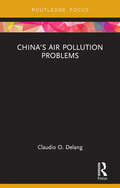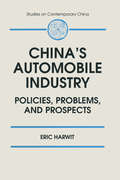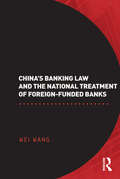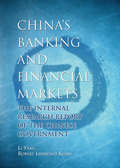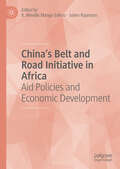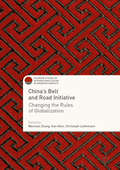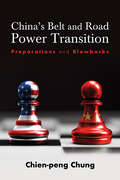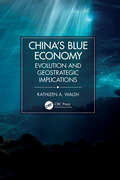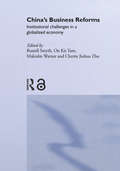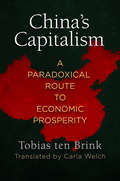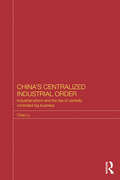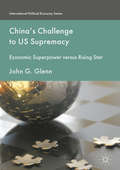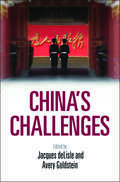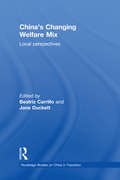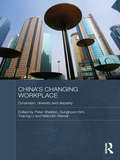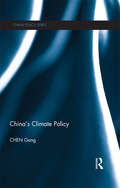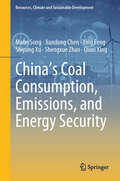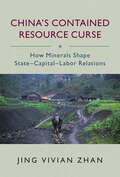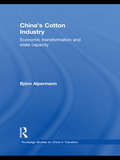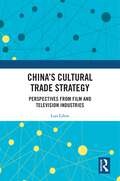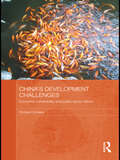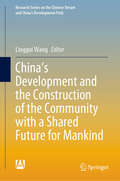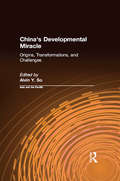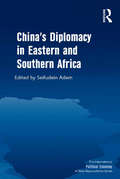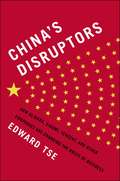- Table View
- List View
China's Air Pollution Problems
by Claudio O. DelangChina’s rapid industrialisation has led to "an air pollution catastrophe". Concerted efforts to achieve economic growth have led to veiled skies of toxic air and created health and morbidity problems as well as tremendous environmental degradation. China’s Air Pollution Problems provides an overview of air pollution in China describing how and why China has ended up in such a dire situation, what the government is doing to address the problem and the difficulties it is encountering in attempting to reduce the pollution. The analysis is based on both grey literature (newspaper articles, NGO reports, Chinese government information) and on academic studies. The grey literature gives a voice to those who suffer from the pollution, their advocates, and government officers, and allows the reader to better grasp the conditions on the ground, and the impact of air pollution among people in different areas in China. The academic literature adds a theoretical perspective and brings these different case studies into a broader context. This book will be of great interest to students of environmental pollution and contemporary Chinese studies looking for an introduction to the topic and also for researchers looking for an extensive list of sources and analysis of China's environmental problems.
China's Automobile Industry: Policies, Problems and Prospects (Studies On Contemporary China)
by Eric HarwitThe author presents an argument for a system of social insurance that replaces welfare with a Guaranteed Adequate Income. The book reviews public assistance programmes, and evaluates other plans that have been proposed.
China's Banking Law and the National Treatment of Foreign-Funded Banks
by Wei WangThis book assesses new developments in and reform of China's banking law system following its accession of the WTO. It focuses on the relationship between GATS/WTO national treatment obligations and China's banking law. Tracing the history of national treatment in China, the book compares the treatment of foreign-funded banks with the treatment of Chinese-funded banks and examines the structure and shortcomings of the existing banking law framework in China. Offering suggestions as to how the framework could be restructured and analysing the economic and political bases of an integrated banking law framework, the book argues that reorganization would bring about greater consistency with GATS/WTO national treatment requirements. The book also explores the ambiguous definition of prudential carve-out, the subtle relationship between GATS national treatment and market access based on WTO cases, national treatment clauses in China’s bilateral investment treaties, and special treatment on banking in China’s free trade agreements. This volume is a valuable resource for academics and students as well as professionals and policy-makers working in the field of banking, WTO, Chinese law and foreign trade.
China's Banking and Financial Markets
by Robert Lawrence Kuhn Li Yang"This is a very timely book. With the recapitalization and reform of China's banking sector now well under way, the banks are on the brink of a new era of growth and expansion. This work is the definitive reference on the banking sector in China, and is an essential tool for anyone seeking to understand the dynamics of financial intermediation on the Mainland. It sets out the facts, free of the judgment calls that so often cloud the true picture of the health of China's banking system."--Dr. David K.P. Li, Chairman and Chief Executive, The Bank of East Asia, Limited"As China continues its impressive pace of economic growth, the rest of the world is constantly reassessing the opportunities and challenges it presents. This book is the first official report on the status of China's financial services industry and financial markets. For the first time, the international community gets access to the same information that the Chinese government uses in making key policies. Such unique insights make this book an essential read for business leaders, investors, policy makers, scholars, and anyone who is interested in understanding China's profound impact on businesses and consumers globally."--Maurice R. Greenberg, Chairman & CEO, C.V. Starr & Co."This is the first book that introduces all aspects of the Chinese banking and financial markets to international audiences. From its developmental history to its contemporary challenges, China's banking and finance markets are presented, explored and analyzed with great detail and in great depth. Both the richness of the data and the scholarly strength of the methodology are a milestone. China's increasing participation in global financial markets makes this book a must read for all financial professionals worldwide."--Lefei Liu, Chief Investment Officer, ChinaLife Insurance
China's Belt and Road Initiative in Africa: Aid Policies and Economic Development
by Julien Rajaoson R. Mireille Manga EdimoThis book provides insight into the economic partnerships between African governments and China offered by the Belt and Road Initiative. It examines the Belt and Road Initiative from a macro and microeconomic perspective to present a detailed understanding of the transformation of African development policies since the initiative began. Particular attention is given to the historical context behind the Belt and Road Initiative, the financing of infrastructure and public services in Africa, the spread of technology from China to Africa, China’s position within the global political order, African energy markets, and the development of special economic zones. This book grounds analysis of the Belt and Road Initiative within specific policies and case studies from Africa. It will be relevant to students, researchers and practitioners interested in development economics and the political economy.
China's Belt and Road Initiative: Changing the Rules of Globalization (Palgrave Studies of Internationalization in Emerging Markets)
by Ilan Alon Christoph Lattemann Wenxian ZhangSince the introduction of the One Belt, One Road initiative (OBOR), first proposed in late 2013, international scholars have begun to study this new policy and its implications in the global age. While OBOR provides new opportunities for China in terms of regional cooperation and global development, many also raise concerns about China’s intentions of using economic means to achieve strategic and foreign policy objectives. Hailing from the West and the East, the authors reflect on the wide-ranging impacts of OBOR on specific countries, regions, economic policies, and geopolitical considerations. Including both theoretical research and empirical studies that explore opportunities and challenges related to OBOR, this edited volume will allow readers to gain a more comprehensive understanding of this ambitious undertaking and its long-term impact on the rest of the world.
China's Belt and Road Power Transition: Preparations and Blowbacks (SUNY series, James N. Rosenau series in Global Politics)
by Chien-peng (C. ChungDetails the Belt and Road global infrastructure development initiative as the most important instrument for China's leadership under Xi Jinping to create an alternative global economic and geopolitical order to challenge the United States.In the opening decades of the twenty-first century the Chinese Communist Party (CCP) leadership under Xi Jinping has created a worldwide Sino-centric network, the Belt and Road Initiative (BRI), to challenge American dominance in world affairs. Encompassing economic, financial, political, and strategic relations, the CCP's belief is that the funds, construction projects, and promises offered by the BRI will generate a widespread perception of the inexorability, legitimacy, and thus acceptability of a Chinese world order. Consisting initially of a land-based "Silk Road Economic Belt," an oceangoing "Maritime Silk Road," and the China-Pakistan Economic Corridor, the BRI has expanded to involve more than 140 countries and includes a Health Silk Road, Digital Silk Road, and Polar Silk Road, but it has also experienced serious challenges. Using power transition theory, Chien-peng Chung carefully investigates and evaluates the enterprise's benefits and shortcomings, concluding that it is still too early to consider the BRI a success.
China's Blue Economy: Evolution and Geostrategic Implications
by Kathleen A. WalshThe United States and China are each actively pursuing development of a Blue Economy to promote greater marine, maritime, and naval capabilities through more innovative, sustainable and environmentally friendly means. This book examines China’s approach to developing a Blue Economy, compares China’s efforts to developments in the United States, analyses prospects for cooperation, and competition, and outlines strategic implications arising from China’s linkage of the Blue Economy development concept to its Maritime Silk Road initiative. An understanding of the Blue Economy as it is being pursued in China and the Indo-Pacific region is extremely relevant for academics, industry professionals, and government officials.Features Describes in detail the development of the Blue Economy concept in China over time Includes geostrategic analysis based on the author's extensive research and explains the implications of China's Blue Economy strategy for the Indo-Pacific region Discusses timely and important topics of interest to government, industry, and academic experts, both present and future Adds value to the studies, interdisciplinary collaborations, and expertise on a complex issue of strategic, technological, and economic concern Clarifies the linkages among Blue Economy, environmental and sustainable development and recognizes the importance of understanding the Blue Economy concept at a global scale This book is written for everyone interested in Blue Economy studies, those who study and practice international relations, environmental policy and development, marine policy and governance, maritime and naval strategy, international and Asian affairs, as well as Indo-Pacific security matters.
China's Business Reforms: Institutional Challenges in a Globalised Economy (Routledge Contemporary China Series #Vol. 3)
by Malcolm Warner Cherrie Jiuhua Zhu Russell Smyth On Kit TamChina's recent economic reforms have led to impressive growth, and an unprecedented enthusiasm for establishing foreign enterprises in China. Since 1993, China has been the second largest recipient of foreign direct investment in the world and is now considered to be the world's third biggest economy. Its greater economic integration with the rest of the world, especially since its accession to the World Trade Organisation (WTO), has further accelerated its market-oriented economic reforms. China is now opening its protected markets and beginning to submit to the rule of international law. This ongoing transition and increasing participation in the world economy has resulted in significant changes in human resource management and social welfare practices in China's enterprises. The book examines the key areas, all of which are linked, where China is grappling with institutional reforms as it opens up to the outside world: state-owned enterprise reform, capital markets and financial reform, human resources and labour market reform, social welfare reform, and China's accession to the WTO and the growth of the private sector.
China's Capitalism: A Paradoxical Route to Economic Prosperity
by Tobias ten BrinkSince 1978, the end of the Mao era, economic growth in China has outperformed every previous economic expansion in modern history. While the largest Western economies continue to struggle with the effects of the deepest recession since World War II, the People's Republic of China still enjoys growth rates that are massive in comparison. In the country's smog-choked cities, a chaotic climate of buying and selling prevails. Tireless expansion and inventiveness join forces with an attitude of national euphoria in which anything seems possible. No longer merely the "workshop of the world," China is poised to become a global engine for innovation.In China's Capitalism, Tobias ten Brink considers the history of the socioeconomic order that has emerged in the People's Republic. With empirical evidence and a theoretical foundation based in comparative and international political economy, ten Brink analyzes the main characteristics of China's socioeconomic system over time, identifies the key dynamics shaping this system's structure, and discusses current trends in further capitalist development. He argues that hegemonic state-business alliances mostly at the local level, relative homogeneity of party-state elites, the maintenance of a low-wage regime, and unanticipated coincidences between domestic and global processes are the driving forces behind China's rise. He also surveys the limits to the state's influence over economic and social developments such as industrial overcapacity and social conflict.Ten Brink's framework reveals how combinations of three heterogeneous actors—party-state institutions, firms, and workers—led to China's distinctive form of capitalism. Presenting a coherent and historically nuanced portrait, China's Capitalism is essential reading for anyone interested in the socioeconomic order of the People's Republic and the significant challenges facing its continuing development.
China's Centralized Industrial Order: Industrial Reform and the Rise of Centrally Controlled Big Business (Routledge Studies on the Chinese Economy)
by Chen LiThis book is about the political economy of China’s industrial reform and the rise of a group of Chinese big businesses under the Communist Party and the central state’s control. It examines the origins, evolution and institutional configuration of this centralized system in governing the ‘commanding heights’ of the Chinese industrial economy. Shaped by persistent industrial policies to develop China’s ‘national champions’ enterprises, the core parts of China’s central industrial ministries and mono-bank system have been transformed into a ‘national team’ of giant modern business firms in industries such as oil, power generation, telecommunications, aerospace, aviation, nuclear, shipbuilding, mining, construction, automobile and banking. Through an adaptive process of learning, experimentation and restructuring, the bedrock of the authority relations and control mechanisms among the Party, government bureaucracy and firms has been consolidated rather than dismantled in the system’s transformation. This alternative view of China’s industrial reform presents a direct challenge to the neo-liberal transition model of China’s institutional development and the mainstream Western conceptions of Chinese big business.
China's Challenge to US Supremacy
by John G. GlennThis book analyzes China’s development in the wider context of the global trade, investment, security, knowledge and production regimes established by the United States. It argues that, although China has thus far been able to enjoy rapid growth within this global architecture, it will have to deal with a more challenging external environment as other states react to its rise. More specifically, it is facing growing pressure to realign its currency, a greater number of trade investment and intellectual property disputes, a more hostile security environment, and exclusionary regional trans-Pacific and trans-Atlantic trade agreements. It is also being confronted by an array of internal issues, from an ageing population and weaknesses in the high tech sector, to over-reliance on foreign companies for exports, non-performing loans and a burgeoning state debt. This, in turn, has led an increasing number of firms to relocate to other countries. For the time being, the author concludes, China's global ambitions and challenge to US supremacy will have to be scaled back. This insightful work will appeal to students and scholars of China's politics, economy and development.
China's Challenges: China's Grand Strategy And International Security (Studies In Asian Security Ser.)
by Avery Goldstein Jacques DeLisleWhen the "fifth generation" of Communist Party leaders in China assumed top political positions in 2012-2013, they took the helm of a country that has achieved remarkable economic growth, political stability, and international influence. Yet China today confronts challenges at least as daunting as any it has faced since the reform era began in the late 1970s. In November 2013, the Chinese Communist Party's Central Committee announced ambitious reforms to address vital issues, such as giving market forces a "decisive role" in the economy, strengthening the social safety net, assigning greater weight to factors other than economic growth and social order in evaluating local officials, promoting urbanization, and relaxing the "one child" policy.China's Challenges brings together fourteen experts on China's social, economic, political, legal, and foreign affairs to examine some of the nation's pivotal policy issues. Their wide-ranging analyses cover economic and social inequality, internal migration and population control, imperatives to "rebalance" China's economy toward domestic demand and consumption, problems of official corruption, tensions between legal reform and social order, and the strained relationships with neighboring countries and the United States that stem from China's rising power, military modernization, enduring territorial disputes, and rising nationalism in domestic politics.This timely volume offers a broad and comprehensive look at the issues facing China today and lays the groundwork for understanding the shifts to come. How—and how well—China handles these challenges not only will define China's trajectory for years to come, but will have repercussions far beyond China's borders.Contributors: Yong Cai, Jacques deLisle, Jane Duckett, Andrew Erickson, M. Taylor Fravel, Avery Goldstein, Yasheng Huang, Zai Liang, Benjamin Liebman, Melanie Manion, Barry Naughton, Daniela Stockmann, Robert Sutter, Guohui Wang.
China's Changing Welfare Mix: Local Perspectives (Routledge Studies on China in Transition)
by Jane Duckett Beatriz CarrilloThis book draws attention to two neglected areas in the growing body of research on welfare in China: subnational variation and the changing mix of state and non-state provision. The contributors to this volume demonstrate the diversity of local welfare provision that lies behind broad national policies and programmes. Their focus on local diversity is particularly relevant to understanding the welfare system in China because national state programmes are so often organized by local governments in line with the specifics of their economic and social development. At the same time that social and economic development is itself independently creating an array of different conditions that shape non-state (family, business and third sector) welfare roles . Through chapters that draw on original research in eight provinces, the book adopts a ‘local’ perspective to illustrate and explain some of the transformations that are under way and discuss not only local government initiatives and programmes, but also the services and support provided by families, informal social networks and community or third sector organizations, as well as those delivered by private businesses on a commercial, for-profit basis. This book will be of interest to students and scholars of Chinese society, social policy, and Chinese studies more widely. Beatriz Carrillo is Lecturer in Asian Studies at the University of Technology, Sydney, Australia Jane Duckett is Professor of Chinese and Comparative Politics at the University of Glasgow, UK
China's Changing Workplace: Dynamism, diversity and disparity (Routledge Contemporary China Series)
by Sunghoon Kim Malcolm Warner Peter Sheldon Yiqiong LiThis book explores the diversity and dynamism of China’s workplaces and of the wider labour market experiences of its workforce. Drawing on the authors’ extensive recent research, it considers a diverse range of issues and types of workplaces. These changes include: the continuing spread of market-oriented human resource management across public and private sector organisations; greater employment rights for workers; local diversity in regulatory control alongside the governmental priority of a ‘harmonious society’; persistent shortages of skilled labour co-existing with vast underemployment amongst the unskilled; uneven access to education and training across regions; and changes in union behaviour and influence. Unlike other studies - which tend to assume changes to management, work and employment are relatively uniform across modernising parts of the economy - this book conveys the rich variety among contemporary China’s local labour markets by looking at them, and the institutions that influence them, from the bottom-up. It focuses on other under-explored but emerging phenomena such as family-owned firms, the role of private services businesses, and the emergence of employer associations.
China's Climate Policy (China Policy Ser.)
by Gang ChenTo understand China’s climate change policy is not easy, as the country itself is a paradox actor in global climate political economy: it used to take very suspicious stand on the scientific certainty of climate change, but recently it has become a signatory and firm supporter of the Kyoto Protocol; it stubbornly refuses to accept any emission cutting obligations, but has gradually taken the lead in developing renewable energies and carbon trading business; it accuses western countries of their hypocrisy and irresponsibility, but ironically maintains close cooperation with them on low-carbon projects; it fears climate mitigation commitments may hamper the economic growth, but meanwhile spends most lavishly on the research and development of clean energy and other green technologies. This book, unlike other researches which explain China’s climate policy from pure economics or politics/foreign policy perspectives, provides a panoramic view over China’s climate-related regulations, laws and policies as well as various government and non-government actors involved in the climate politics. Through analyzing the political and socioeconomic factors that influence the world’s largest carbon emitter’s participation into the global collective actions against climate change, the book argues that as a vast continental state with a mix of authoritarian politics and a quasi-liberalised market economy, China’s climate policy process is fragmented and self-defensive, seemingly having little room for significant compromises or changes; yet in response to the mounting international pressures and energy security concerns and attracted by lucrative carbon businesses and clean energy market, the regime shows some sort of better-than-expected flexibility and shrewdness in coping with the newly-emerged challenges. Its future climate actions, whether effective or not, are vital not only for the success of the global mitigation effort, but for China’s own economic restructure and sustainable development. The book is a unique research monograph on the evolving domestic and foreign policies taken by the Chinese government to tackle climate change challenges. It concludes that instead of being motivated by concern about its vulnerability to climate change, Chinese climate-related policies have been mainly driven by its intensive attention to energy security, business opportunities lying in emerging green industries and image consideration in the global climate politics.
China's Coal Consumption, Emissions, and Energy Security (Resources, Climate and Sustainable Development)
by Malin Song Jiandong Chen Ying Feng Shiyang Xu Shengxue Zhao Qiuxi XingThis book employs a systematic and multi-faceted approach to explore China's coal consumption, emissions, and its development model. The book first provides an overview of the global and Chinese energy consumption trends and mix, with a particular focus on the position and role of coal. Through comparative analysis, it clarifies the importance of coal in global and Chinese energy security. It details the environmental problems arising from coal consumption, especially carbon dioxide and other harmful gas emissions, and their impacts on global climate change and human health. By collecting and analyzing extensive data, such as coal consumption volumes and carbon dioxide emission levels, the book presents the historical trends and current status of China's coal consumption and emissions. The book conducts comparative study on China and global policies related to coal consumption control and clean energy development, providing insights and lessons for China. It explores the development model of technologies such as clean and efficient coal utilization, renewable energy, and carbon capture and storage (CCS), assessing their potential to reduce coal consumption and emissions.
China's Contained Resource Curse: How Minerals Shape State Capital Labor Relations
by Vivian Jing ZhanAs a country rich in mineral resources, contemporary China remains surprisingly overlooked in the research about the much debated 'resource curse'. This is the first full-length study to examine the distinctive effects of mineral resources on the state, capital and labour and their interrelations in China. Jing Vivian Zhan draws on a wealth of empirical evidence, both qualitative and quantitative. Taking a subnational approach, she zooms in on local situations and demonstrates how mineral resources affect local governance and economic as well as human development. Characterizing mining industries as pro-capital and anti-labour, this study also highlights the redistributive roles that the state can play to redress the imbalance. It reveals the Chinese state's strategies to contain the resource curse and also pinpoints some pitfalls of the China model, which offer important policy implications for China and other resource-rich countries.
China's Cotton Industry: Economic Transformation and State Capacity (Routledge Studies on China in Transition)
by Björn AlpermannThe cotton processing industry is a distinct sector of China’s rural economy which recently underwent a momentous transition from plan to market. China is the world’s largest producer as well as consumer of cotton, and cotton processing links the agricultural production of this important commodity to China’s booming textile industry. Alpermann examines the political economy of the cotton processing industry, analyzes the process of cotton policy making and discusses reform outcomes on a national scale and the central state’s response. He then goes on to examine the implementation of economic transformation and institutional change in two traditional cotton-growing regions, looking at how local governments and the former monopolist cope with the changes brought about by marketization. Studying the cotton industry provides a lens through which to observe the changes in the way the state governs the economy during China’s transition and helps to assess the diverging claims about the nature of the political economy in China. As such China's Cotton Industry is an essential read for anyone studying Chinese business, econmics or politics.
China's Cultural Trade Strategy: Perspectives from Film and Television Industries
by Luo LibinThis book aims to provide theoretical and empirical interpretations of certain phenomena in the development of China's cultural industry. Using the film and television industries as the major cases, the author proposes suggestions on China's ongoing development of foreign cultural trade. The author argues that China is well positioned to take full advantage of the opportunities of globalization, to develop its cultural industry in a leapfrog manner. China's rapid economic growth drives the country's development from a small cultural market to a large one. Since it is a middle-income country, its cultural industry still has a relatively large potential to grow. The study on China's foreign cultural trade strategy can contribute to the growing needs of people for a better life and enhance China's "cultural confidence". With an explanation of existing practices, this book also aims to make recommendations on China's strategy for developing foreign cultural trade in the era of globalization. This book will be a good read for students, researchers and scholars of Chinese studies, East Asian studies and culture economics, and those interested in China's film and television industries.
China's Development Challenges: Economic Vulnerability and Public Sector Reform (Routledge Studies on the Chinese Economy)
by Richard SchiereThis book argues that a major potential source of social tension in transition and developing countries is not poverty as such, but vulnerability: that is, the risk of becoming poor. It demonstrates how in China many of the recent reforms to the public sector, such as decentralisation from central to local government, especially fiscal decentralisation; the reduction in public services provided by the state; the increasing practice of local government of charging fees for basic services which were previously free; de-collectivisation of the rural commune system and market sector experimentation in Economic Processing Zones have made many households extremely vulnerable to poverty. Having to find funds to pay for health and education leaves the households exposed should macro-economic fluctuations related to factors – such as trade, resource imports, and financial volatility – have an adverse impact on the Chinese economy overall. The book argues that to become less vulnerable to macroeconomic shocks China would need to shift from an export-oriented development strategy to a domestic consumer-demand driven development strategy, and this would need to be supported by public sector reforms: strengthening of public service provisions in the health and the education sectors as well as expanding social security programs. The book discusses these problems, relates them to the economic literature and outlines the likely consequences.
China's Development and the Construction of the Community with a Shared Future for Mankind (Research Series on the Chinese Dream and China’s Development Path)
by Malcolm ThompsonThis book focuses on China’s experience in development over the past 70 years and its significance, as well as building a community with a shared future for mankind. The book consists of a collection of papers contributed by researchers from many countries, covering the topics of world order, a community with a shared future for mankind, “the Belt and Road” initiative, exchange and mutual learning between civilizations, China Model, China and the World, multi-bilateral relationship, sustainable development.
China's Developmental Miracle: Origins, Transformations, and Challenges
by Alvin Y. SoIn contrast to the failure to economic reforms in Eastern Europe, China's economic reforms have been quite successful. Decollectivization, marketization, state enterprise reforms, and reintegration into the world economy have led to very rapid economic development in China over the past two decades. These economic reforms, in turn, triggered profound social and political changes. This collection examines the origins, nature, and impact, as well as the future prospects of these reforms and changes. The contributors are all active researchers from a variety of disciplines, including economics, sociology, political science, and geography.
China's Diplomacy in Eastern and Southern Africa (The International Political Economy of New Regionalisms Series)
by Seifudein AdemIn contemporary discourse on China-Africa relations, there are, on the one hand, the Sino-pessimists who see China as a giant vacuum-cleaner, sucking up Africa’s resources in order to fuel its own rapid industrialization, and destroying Africa’s development potential in the process. On the other hand, the Sino-optimists see China as the ultimate savior of Africa, capable of or willing to 'develop' the continent. Between the two divergent schools of thought are those sitting on the fence for the time being, the Sino-pragmatists, who are less sanguine for sure about what Africa would gain from China-Africa relations, but are nevertheless willing to reserve judgment until the dust settles. This book is innovative in two ways: it introduces a regional approach to the study of China-Africa relations by focusing on Eastern and Southern Africa; and it puts forward a disciplinary framework- disciplinary in both senses of that term- for interrogating the burgeoning literature about China-Africa relations by conceptualizing the three schools of thought mentioned above.
China's Disruptors: How Alibaba, Xiaomi, Tencent, and Other Companies are Changing the Rules of Business
by Edward TseIn September 2014, Chinese e-commerce giant Alibaba raised $25 billion in the world's biggest-ever initial public offering. Since then, millions of investors and managers worldwide have pondered a fundamental question: What's really going on with the new wave of China's disruptors? Alibaba wasn't an outlier--it's one of a rising tide of thriving Chinese companies, mostly but not exclusively in the technology sector. Overnight, its founder, Jack Ma, appeared on the same magazine covers as American entrepreneurial icons like Mark Zuckerberg. Ma was quickly followed by the founders of other previously little-known companies, such as Baidu, Tencent, and Xiaomi.Over the past two decades, an unprecedented burst of entrepreneurialism has transformed China's economy from a closed, impoverished, state-run system into a major power in global business. As products in China become more and more sophisticated, and as its companies embrace domestically developed technology, we will increasingly see Chinese goods setting global standards. Meanwhile, companies in the rest of the world wonder how they can access the fast-rising incomes of China's 1.3 billion consumers.Now Edward Tse, a leading global strategy consultant, reveals how China got to this point, and what the country's rise means for the United States and the rest of the world. Tse has spent more than twenty years working with senior Chinese executives, learning firsthand how China's most powerful companies operate. He's an expert on how private firms are thriving in what is still, officially, a communist country. His book draws on exclusive interviews and case studies to explore questions such as*What drives China's entrepreneurs? Personal fame and fortune--or a quest for national pride and communal achievement?*How do these companies grow so quickly? In 2005, Lenovo sold just one category of products (personal computers) in one market, China. Today, not only is it the world's largest PC seller; it is also the world's third-largest smartphone seller.*How does Chinese culture shape the strategies and tactics of these business leaders? Can outsiders copy what the Chinese are doing?*Can capitalists really thrive within a communist system? How does Tencent's Pony Ma serve as a member of China's parliament while running a company that dominates online games and messaging?*What impact will China have on the rest of the world as its private companies enter new markets, acquire foreign businesses, and threaten established firms in countless industries?As Tse concludes: "I believe that as a consequence of the opening driven by China's entrepreneurs, the push to invest in science, research, and development, and the new freedoms that people are enjoying across the country, China has embarked on a renaissance that could rival its greatest era in history--the Tang dynasty. These entrepreneurs are the front line in China's intense hunger for success. They will have an even more remarkable impact on the global economy in the future, through the rest of this decade and beyond."From the Hardcover edition.
